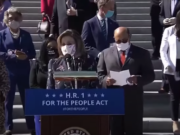Last week, Doris Haddock, a.k.a. “Granny D,” passed away at the age of 100. Granny D gained some small measure of fame in 1999-2000 by walking across the country (at the age of 90) to try to gain support for the cause of the McCain-Feingold bill and campaign finance reform more generally. Her walk roughly coincided with the period that my nomination to the Federal Election Commission was stalled in the Senate, in large part due to opposition from and holds placed on the nomination by Senators McCain and Feingold. I recall one day when Tamara Somerville, the tough as nails Staff Director for the Senate Rules Committee under Senator Mitch McConnell, looked at me and said in her most sincere voice, “If it would help, Brad, I’d drive across the country for your confirmation.”
Haddock was born in Laconia, New Hampshire on Lake Winnipesaukee, where I spent most of my childhood summers. Even when I was a kid there in the 1960s, it was long before the days of condos and the interstate. It was a place of tremendous natural beauty, a rugged mountain state where people were fiercely independent. Befitting the area, Haddock was undoubtedly a feisty, engaging, and concerned woman.
But I also wonder if it ever dawned on Granny D that it cost a not insubstantial amount of money to make a success of her long walk against money in politics. Considerable efforts were put into organizing rallies, arranging media coverage, and publicizing her walk, and such organizing takes cash. Haddock later wrote a book, Walking Across America in My 90th Year, about her journey, with help from Dennis Burke, Director of Arizona Common Cause, a well-funded lobbying group. (Oddly enough, when I pulled up the book’s Amazon listing to put in the link just above, the page featured my book, Unfree Speech: The Folly of Campaign Finance Reform, under “books on related topics.”) The book was published by a large corporation, Random House, and it contained political advocacy. In other words, in Doris Haddock’s campaign finance world, exemplified by the government’s position in Citizens United v. FEC, her book could have been banned by the government. Later she wrote another book, “You’re Never Too Old to Raise a Little Hell.” Also published by a large corporation (Villard), it includes a forward by Bill Moyers, who, as President of the Florence and John Schumann Foundation, poured millions of dollars into the “reform” movement while denouncing the influence of money.
Granny D also didn’t come out of nowhere to walk for reform. In the 1960s, she had been a reasonably well-known anti-nuclear activist, and was plugged into various liberal groups in the years after. The progressive prism through which she saw political issues was so complete that she considered the failure to enact campaign finance reform as the root cause of the September 11, 2001 attacks on the World Trade Center and the Pentagon, and also necessary to prevent future such attacks. The day after the attacks, Haddock wrote at the left-wing site Buzzflash, “the question that will determine the security of our cities in the future– is this: can those American values be expressed by the American government? Can we be more a government of our people? Can we get the greedy, short-sighted interests out from between us and our elected representatives? Our struggle for campaign finance reform and other democratic reforms will now take a back seat as blood and its disciples have their day. But until we clean up our government, we will all be the targets of rising international rage, and our children and grandchildren are not safe.”
Yet among such nonsense, one has to admire a certain core suspicion of government, as when she wrote, “If … we will all have our telephones tapped and be rounded up for criticizing the government –that we must be fascist to be free– then they are talking illogically and immaturely.” Sadly, she devoted many of the last years of her life to encouraging others to trust the government to regulate speech, and never saw the irony of having her own efforts given attention primarily thanks to the support of big money and well-funded lobbying groups.
These inconsistencies aside, the fact that she would walk across America at age 90 for something she believed in should be an inspiration to us all. Let us hope others will walk for more deserving causes.
Doris Haddock, R.I.P.













